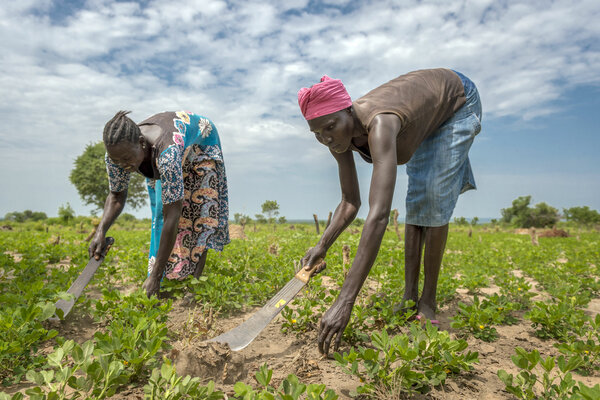Why South Sudan must give peace a chance
This story is part of a series to mark the World Food Programme (WFP) receiving the 2020 Nobel Peace Prize in Rome on 10 December. Click here to watch 'The People's Prize' event on Facebook.
This year began with high hopes for peace and stability in the world’s youngest country but 2020 is ending with the reversal of critical humanitarian gains made since the civil war ended on 22 February.
Violence still plagues parts of South Sudan. The country of 12 million people is torn by the impact of years of conflict at a national level. Now hostilities frequently erupt among communities over natural resources.

To make matters worse, catastrophic floods have swept across the eastern and central regions, leaving behind a trail of devastation and plunging many people deeper into hunger and poverty.
While the floods, the economic downturn accompanying the COVID-19 pandemic, and a lack of basic services play a role in worsening humanitarian conditions, the main culprit derailing the country’s progress is the tide of local and sub-national violence that frequently erupts over land, valuable livestock — mainly cattle — and water.
The World Food Programme (WFP) in South Sudan recognizes that conflict is the major driver of severe hunger, poverty and displacement. “Peace is the key to unlocking potential solutions for the future of South Sudan,” says Matthew Hollingworth, WFP Country Director in South Sudan.
Since December 2013, the country's struggled with violence that pushes desperately needed peace and stability ever further out of reach.
The vast majority of the 1.5 million internally displaced South Sudanese have lost their homes, livelihoods and loved ones while fleeing raids carried out by armed men who loot and burn villages and often kidnap children and women.
Tit-for-tat violence costs hundreds of lives. It also hinders humanitarian efforts that act as a lifeline to affected communities.
“Millions of people are still struggling daily, trying to cope with severe levels of hunger, malnutrition, the lack of livelihoods and the precarious living conditions they are in,” says Hollingworth.

This was not how it was supposed to be. WFP viewed the formation of the government of national unity earlier this year as a chance to expand beyond its food assistance operations and increase its resilience-building programmes that promote long-term food security and people’s ability to grow their own food.
'There is no magic formula for peace—everyone can take part in contributing to stability'
“There is a limit to what humanitarian assistance can achieve in saving and improving the lives of people. To implement such programmes successfully, we need peace and stability,” says Hollingworth.
Areas of relative peace and stability make it possible to implement resilience-building schemes such as cash transfers that include the exchange of physical money, bank transfers, as well as electronic vouchers redeemable for food at retail shops, helping families meet their food needs while giving them the ability to diversify their diets.

In 2019, WFP supported the local economy by injecting $46 million dollars in local markets through its cash-based transfers programme.
WFP is also tackling entrenched inequality and isolation among South Sudanese communities through projects that contribute to unity and pave the way for long-term peace. In the northern areas of Ajong, Dungop, Pagai and Bulyom Bomas of Twic County, WFP runs a cash programme that invests in building assets like shallow wells and multi-purpose ponds that have helped to reduce fighting over water resources.
Training and compensating people for building much-needed infrastructure such as access roads to connect communities to local markets or dykes to control flooding, as well as supporting farming, have improved people’s food security, agriculture, trade and movement. Last year, nearly 600,000 people benefited from such resilience-building activities.
“There is no magic formula for peace,” says Hollingworth. “Everyone can take part in contributing to stability in South Sudan and its potential growth by giving its fragile peace a chance to grow, providing a lifeline for the vulnerable and helping to build their resilience.”



